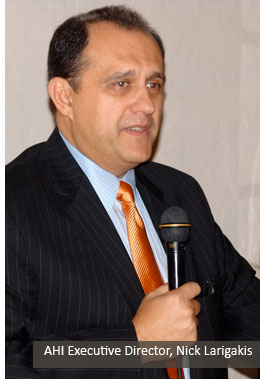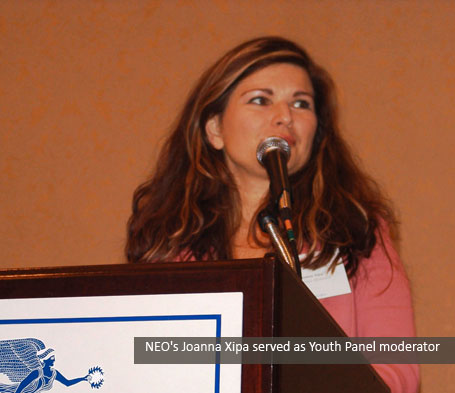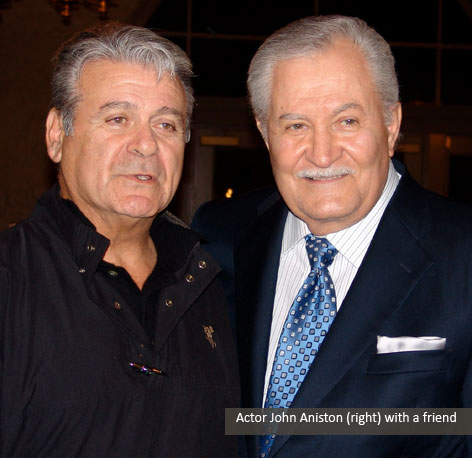The 9th Annual “Future of Hellenism in America” Conference, hosted by the American Hellenic Institute Foundation (AHI) was held recently in L.A., at The Beverly Hilton Hotel.
 More than 25 prominent speakers were featured from across the country who analyzed key issues including the future of Greek American businesses & organizations, the political process and lobbying, religious and ethnic identity, Greek education and perspectives from the Youth. AHI Executive Director, Nick Larigakis opened the conference and welcomed notable speakers including: award-wining actor John Aniston; Kary Antholis of HBO Films; Andreas Kyprianides, honorary consul, Republic of Cyprus (in L.A.); and U.S. Congressman Gus Bilirakis (R-FL). A summary of all the speakers’ remarks can be found by clicking on the Conference Summary link in the AHI website (http://www.ahiworld.com/press_releases/2010_086.html)
More than 25 prominent speakers were featured from across the country who analyzed key issues including the future of Greek American businesses & organizations, the political process and lobbying, religious and ethnic identity, Greek education and perspectives from the Youth. AHI Executive Director, Nick Larigakis opened the conference and welcomed notable speakers including: award-wining actor John Aniston; Kary Antholis of HBO Films; Andreas Kyprianides, honorary consul, Republic of Cyprus (in L.A.); and U.S. Congressman Gus Bilirakis (R-FL). A summary of all the speakers’ remarks can be found by clicking on the Conference Summary link in the AHI website (http://www.ahiworld.com/press_releases/2010_086.html)
 Honored to be moderating the Youth Panel Discussion at the end of the day, after attentively listening to all presentations, I felt both excited and a bit overwhelmed. I admit the task before us is abominable, yet I strongly believe that all the impossible IS possible. Gone are the days when this U.S. Melting Pot made us forget about where we come from and who we are. Coming from a Greek immigrant background, where we value our roots, we take deep offense to others telling us who we can and cannot be. But after being made aware of the dire statistics of our dwindling language and traditions practiced by our students today, I was pleasantly surprised to hear that our sense of ethnic pride is on the other hand, rising among young Greek Americans!
Honored to be moderating the Youth Panel Discussion at the end of the day, after attentively listening to all presentations, I felt both excited and a bit overwhelmed. I admit the task before us is abominable, yet I strongly believe that all the impossible IS possible. Gone are the days when this U.S. Melting Pot made us forget about where we come from and who we are. Coming from a Greek immigrant background, where we value our roots, we take deep offense to others telling us who we can and cannot be. But after being made aware of the dire statistics of our dwindling language and traditions practiced by our students today, I was pleasantly surprised to hear that our sense of ethnic pride is on the other hand, rising among young Greek Americans!
We live in a dichotomy of honoring our family traditions, while respecting our friends & neighbors around us, enjoying the best of both worlds. The question is: How do we continue our Hellenic identity from one generation to the next? Despite all the available resources, it all starts and ends in our families. Both parents need to be consistent in their belief systems. Just being Greek-blooded is not always enough, because both Greek and mixed families have shown varying degrees in their sense of Hellenism, confirmed through my personal experiences in both private and Church-based Greek language instruction. The common thread we need is ‘thelisi’ i.e. a strong will. Stressing the importance of learning a 2nd language, or even a 3rd, is possible when we get involved early enough.

Even in today’s global economy, there’s a growing need to fill bi-lingual job vacancies for careers locally and world-wide. So why not start them young to connect with the very core of our culture – our language? Learning the foundations of the richest language in the world will allow students to excel in the Maths & Sciences, as well as appreciate the heart of Greek Literature and story telling dating as far back as 1200 BC and now glamorized through today’s media. I’m thrilled that Hollywood now recognizes the need to tell our story! This gives our future filmmakers the opportunity to use this powerful tool to raise awareness of Greek issues, much like the Jews did for Isreal. More & more Greek Film Festivals have been surfacing across the America over the past 20 years from NY to LA, as our turn has finally come!

Where there’s a will there’s a way! We need to step forward with a much more active role in socializing our children, nurturing them from a very young age, within the family. When they go off to college, it would be nice to see them heading their respective Hellenic Students Associations across all the major universities in the country; however there’s a harsh reality today proving that the majority of the members are foreign Greek students from abroad, coming together to see familiar faces from their homeland. Sadly, not enough Greek American students are representing – proof that somewhere along the lines, we’ve gone astray.

We cannot become dependent on society around us, waiting for our churches, organizations, industry leaders and executives to guide our youth. These can only work alongside the pre-existing passion ignited from within our families. Take Konstantina Konugres, for example, a 16 year old high school student, who together with her cousin, took it upon themselves to start a social Greek Club at her local high school, in Orange Country, CA. She noticed the need to dispel the myths/stereotypes of being Greek-American. Open to all students of all backgrounds, they called it “Get your Greek On” offering monthly club meetings/social outings enjoying Greek food, music & fellowship – a perfect way to promote Greek culture to the world around them – with an average of 20-30 new students joining per month (in a school with only 5 Greek-American students enrolled)! It doesn’t take much, now does it?
So my conclusion lies in the notion of awareness: the more we talk about it amongst our colleagues, peers and especially within our own families, the more likely our chances of rekindling the eternal flame to lead by example in making our voices heard. If we care at all with what our homeland is going through, then, this, in my eyes, is where the future of Hellenism not only in America, but around the world, lies.



























